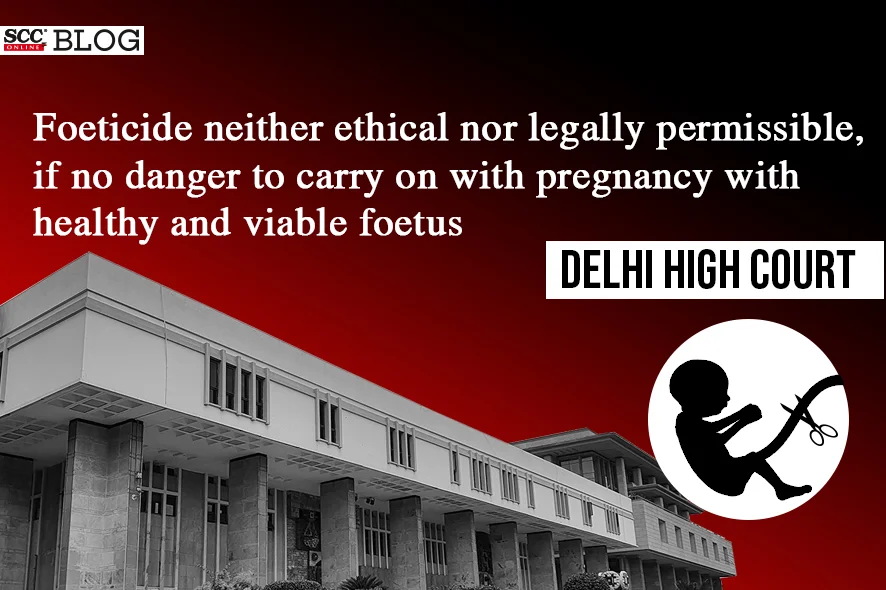Delhi High Court: In a case wherein the petitioner had sought directions for permitting medical termination of her ongoing pregnancy of twenty-eight weeks under the Medical Termination of Pregnancy Act, 1971 (‘the Act’), Subramonium Prasad, J.*, referred to ultrasound report conducted on the petitioner and opined that there was no congenital abnormality in the foetus, nor any danger to the mother to carry on with the pregnancy which would mandate termination of the foetus. The Court opined that since the foetus was viable and normal, and there was no danger to the petitioner to carry on with the pregnancy, foeticide would neither be ethical nor legally permissible. The Court opined that the petitioner was already seven months pregnant with a healthy and viable foetus and since the case of the petitioner did not fall within the four corners of the Act and the Rules framed thereunder, the prayer sought for by the petitioner for a direction to the All India Institute of Medical Sciences (‘AIIMS’) for premature termination of pregnancy/delivery of the child could not be acceded to by this Court.
Background
In an instant case, the petitioner was an unmarried female student of twenty years and on 25-01-2024, the petitioner visited a diagnostic center for an ultrasound scan and during the same, it came to the petitioner’s knowledge that she was twenty-seven weeks pregnant, and her due delivery date was 25-04-2024.
The petitioner stated that prior to the ultrasound scan, the petitioner had not found any symptoms of pregnancy due to her irregular menstrual periods. It was contended that carrying the pregnancy would cause grave injury to the petitioner’s physical and mental health. It was also pointed out that the petitioner was an unmarried student without any source of income and there would be social stigma and harassment associated with her, and continuing the pregnancy would jeopardize her career and thereby her future.
Thus, the petitioner filed the present petition.
Analysis, Law, and Decision
The Court noted that in case of pregnancy which exceeded twenty weeks, but was within twenty-four weeks, it might be terminated if an opinion on the same parameter was produced by two registered medical practitioners, and the cases of such category of women was prescribed under Rule 3(2)(b) of the Act. The Court further referred to Section 5 of the Act and X v. Union of India, 2023 SCC OnLine SC 1338, and opined that the pregnancy which was beyond twenty-four weeks could only be terminated if requirements provided under Section 5 of the Act were satisfied and the decision has been made to save the life of the pregnant woman or to the satisfaction of Section 3(2)(b) and Section 3(2)(a)(i) of the Act for substantial foetal abnormalities.
The Court referred to ultrasound report conducted on the petitioner and opined that there was no congenital abnormality in the foetus, nor any danger to the mother to carry on with the pregnancy which would mandate termination of the foetus. The Court opined that since the foetus was viable and normal, and there was no danger to the petitioner to carry on with the pregnancy, foeticide would neither be ethical nor legally permissible. The Court opined that the guidelines dated 06-08-2018, could not be relied upon, as according to these guidelines, the medical termination of pregnancy beyond twenty-four weeks was permitted, only in cases of minor girls who were rape victims or when there were congenital abnormalities in the foetus. However, since the present case did not come under any of the categories, this Court was not inclined to accept the petitioner’s prayer of foeticide.
The Court opined that the petitioner was already seven months pregnant with a healthy and viable foetus and since the case of the petitioner did not fall within the four corners of the Act and the Rules framed thereunder, the prayer sought for by the petitioner for a direction to the All India Institute of Medical Sciences (‘AIIMS’) for premature termination of pregnancy/delivery of the child could not be acceded to by this Court.
The Court further stated that if the petitioner wanted to approach AIIMS for delivery and the future course of action, it was open for the petitioner to approach AIIMS, as being a premier institute, it would render all facilities and advise the petitioner regarding her pregnancy. Further, if the petitioner was inclined to give newborn child to the adoption, then the petitioner would be at liberty to approach the Union of India, and the Court directed Union of India to ensure that the process of adoption takes place at the earliest and in a smooth fashion.
[S v. Union of India, 2024 SCC OnLine Del 736, decided on 05-02-2024]
*Judgment authored by- Justice Subramonium Prasad
Advocates who appeared in this case:
For the Petitioner: Dr. Amit Mishra, Advocate;
For the Respondents: Nidhi Raman, CGSC with Priya Mishra, GP and Sachin Dubey, Advocate; Mehak Nakra, ASC (C) for GNCTD with Abhishek Khari and Disha Chaudhory, Advocates.







